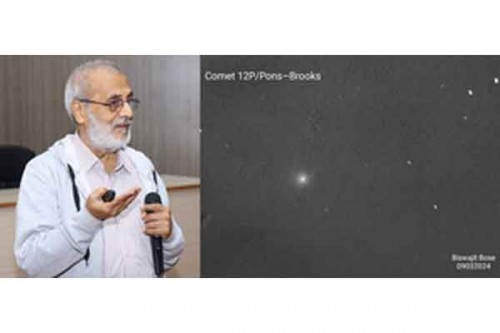Celestial 'Devil' comet 12P/Pons-Brooks' date with Earth on April 21 after 71 years

Mumbai, March 12 (IANS) A periodical comet, named '12P/Pons-Brooks' is scheduled to greet Earth from its closest point in the dark skies from April 21 as it zooms towards the sun on its return journey after 71 years, exciting the international scientific community.
This week, the comet gave its early glimpses to humanity as a bright, tiny spot which was captured on camera by some astronomers from India, scientist and founder-secretary of the Amateur Astronomers Association (Mumbai) Dr. Bharat Adur told IANS.
Among them was an amateur astronomer from Jorhat, Assam, whose photos of 12P/Pons-Brooks’ was shared on social media by Biswajit Bose of Kolkata, sending thrills among the sky-gazer community all over, and now they await the comet’s perihelion passage, gushed Dr. Adur.
The ‘perihelion passage’ – starting from April 21 - refers to the 12P/Pons-Brooks’ closest point to the sun when it will shine the brightest, and then will approach Earth till around 232 million kms by June 2, when it will be visible from many parts of the world, but it will be fainter.
This comet, as reported by a respected global magazine, ‘Astronomy’ last month, is estimated to be bigger than Mt. Everest (8,848 metres), and as per experts’ calculations in a 2020 research paper, the chunks of ice and rocks were nearly 17 kms across – more than double the world’s tallest mountain.
The comet has a nucleus estimated at around 30 kms in diameter, and everything hurtles at a dizzying speed of nearly 26,000 km/hour, with the streak increasing as it approaches the Sun.
“Brightest classical Halley-type periodic comet ‘12P/Pons–Brooks’ with an orbital period of 71 years reaching an absolute visual magnitude, ~5 in its approach to perihelion. This is how it was seen from a city like Kolkata with sky brightness nearly about Bortle Scale 9 (on March 9) evening at a very low elongation over the northwest horizon,” said Bose on social media.
The inter-galactic visitor is a cold, active cryovolcanic comet zipping through the skies and has earned a wicked nickname - the ‘Devil Comet’ - since it periodically explodes violently, releases ‘cryomagma’ comprising billions of kgs of ice, water and gases (meteoric shower) that give it an irregular shape resembling a Devil’s horns.
Among the brightest known periodic comets, the ‘12P/Pons-Brooks’ was first discovered in July 1812 by astronomer Jean-Louis Pons, and later by William Robert Brooks in 1883, during its return journey to the solar system, though there were several other astronomers credited with sighting it around the world in the past eight centuries.
Dr. Adur said that as per the StarWalk app, the 12P/Pons-Brooks was last seen at perihelion on May 22, 1954, and later, humanity witnessed and wowed at the electrifying Halley’s Comet (1986).
“Probably, nobody currently living on earth may have seen the 12P/Pons-Brooks in 1954, or anybody over 71 years alive now would have been infants or toddlers at that time…” chuckled Dr. Adur.
The best part is that the comet shall be visible brightly even during the Total Solar Eclipse (over USA, Canada, Mexico, but will not be witnessed in India) of April 8, at 16.48 GMT, when the 12P/Pons-Brooks will be at 27 degrees from the Sun and close to Jupiter which will also be visible at that time, as per the StarWalk, he explained.
In fact, in the last week of December 2023, the comet had suddenly come into the limelight after a series of violent explosions rocked it and let off the ‘meteor showers’, very far away from Earth, and the next visit to the solar system is scheduled in August 2095.
Hoping to bequeath the legacy of the upcoming ‘12P/Pons-Brooks’ stellar voyage for future generations, the AAA (Mumbai) has launched a series of awareness campaigns for the masses, instructions on when, where and how to view the comet, photography-videography, scientific discussions, academic competitions and other activities, especially for the students and youth, said Dr. Adur.

|

|

